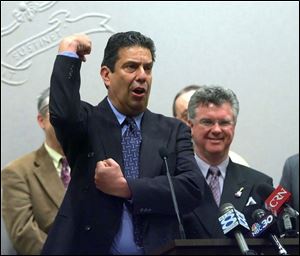
Under new Ohio law, bands claiming to be classic acts must have an original member
1/17/2009
Jon Bowzer Bauman demonstrates his trademark move as Bowzer when he was in the band Sha Na Na at a 2006 news conference in Connecticut about his Truth in Music bill.
COLUMBUS When The Drifters take to the nostalgia circuit in Ohio to croon Up on the Roof or The Platters declare it s Twilight Time for the millionth time, there d better be at least one voice up there that was heard on the records.
A new law just passed by state lawmakers and signed by Gov. Ted Strickland could lead to fines as high as $15,000 under the Consumers Sales Practices Act against a band that proves to be little more than The Great Pretender.
When the law takes effect April 6, Ohio will become the 27th state in four years to prohibit live acts from misleading ticket buyers and concert venue operators into believing they are the real thing when the originals who made the songs classics are nowhere to be found.
The public is entitled to know what it s going to see, said John Bauman, better known as Bowzer, formerly of Sha Na Na. The oldies act soared in the 1970s, headlining its own TV show and appearing in the blockbuster movie Grease.
You have to have a legitimate link to the group itself, he said. If the federal trademark laws worked effectively, we wouldn t need these state laws.
Mr. Bauman now headlines shows like Bowzer s Ultimate Doo-Wop Party that showcase classic vocal bands.
I ve routinely worked with the original people from all kinds of groups from the 1950s like The Coasters. The Drifters, and The Platters, he said. I ve watched these problems develop in a heartbreaking way. These were the most valuable group names of that era.
Imposter groups spring up, sometimes from one source who turns the whole thing into an industry, he said.
The names weren t protected to begin with, and there have been lawsuits over the years. Someone saw there was an opening to take advantage of the confusion by putting out imposters, under-priced counterfeit groups who fool the public and take work away from the originals.
Mr. Bauman is now chairman of the Truth in Music Committee of the Vocal Group Hall of Fame located in Sharon, Pa., just over the Ohio border.
Sen. Robert Schuler (R., Cincinnati) , the bill s sponsor, introduced the bill after he attended a reception hosted by the Cleveland-based Rock and Roll Hall of Fame.
Mary Wilson, who used to sing with The Supremes, explained to me that there were groups out there calling themselves The Supremes who had no history with The Supremes, he said. She didn t think that was fair, and I agreed. They re making the money and saying they re The Supremes when they are really cover bands playing Supremes songs.
His law forbids an act from presenting itself as a well-known band if none of the members is an original performing member who never abandoned his affiliation with the group or who legally owns the trademark rights to the name. Otherwise, the act must clearly advertise itself as a tribute or salute to the original.
While failure to register a trademark name of a band is less likely today in the commercially savvy world of pop music, it can still happen. Mr. Bauman said there is a new tour version of Frankie Goes to Hollywood that has no relationship to the 1980s English pop band that charted with Relax.
Ohio was the last state among those initially targeted by the Truth in Music project. The top priorities included the heavily populated states, most of them in the Northeast, where such nostalgia concerts are most popular. Next on the target list are smaller states.
If Carl Gardner is not in The Coasters, then they re not The Coasters, said Bob Crosby, president of the Vocal Group Hall of Fame & Museum.
He s the last living singer on the original recordings, he said. He did not abandon the group and is the trademark holder.
But that hasn t prevented look-alike groups from performing as The Coasters. The new law would empower Ohio s attorney general to seek an injunction to prevent such a performance and to seek fines of between $5,000 and $15,000 for violations.
Mr. Bauman said enforcement actions in other states have not typically stopped performances but rather forced acts to change their advertising, followed by a polite suggestion that they not come back once the show is done.
Under the law, even well-known names like Lionel Richie, who walked away from The Commodores for an even more successful solo career, couldn t return to the stage with a new band and call themselves The Commodores. He doesn t own the name.
He could advertise as Lionel Richie, formerly of The Commodores, said Mr. Crosby. If you abandon the group, you abandon the name. If all the members abandon the group, then it s chaos until someone has the trademark.
Tribute acts to classic bands have always been popular. Tours of Beatlemania and Abba look-alikes Bjorn Again have appeared everywhere, but audience members are under no illusions that they are in the presence of the original bands.
There are still acts that slip through the cracks. Mr. Crosby noted that the Little River Band that Americans might see on the road contains no original members from the 1970s Australian original. But the originals don t own the rights to the name.
It s legal under this law, but that doesn t make it right, said Mr. Crosby. It prevents there from being six or seven Little River Band tours out there. It brings it down to one. Then it becomes the education of the public. The law is not perfect.
Contact Jim Provance at: jprovance@theblade.com, or 614-221-0496.